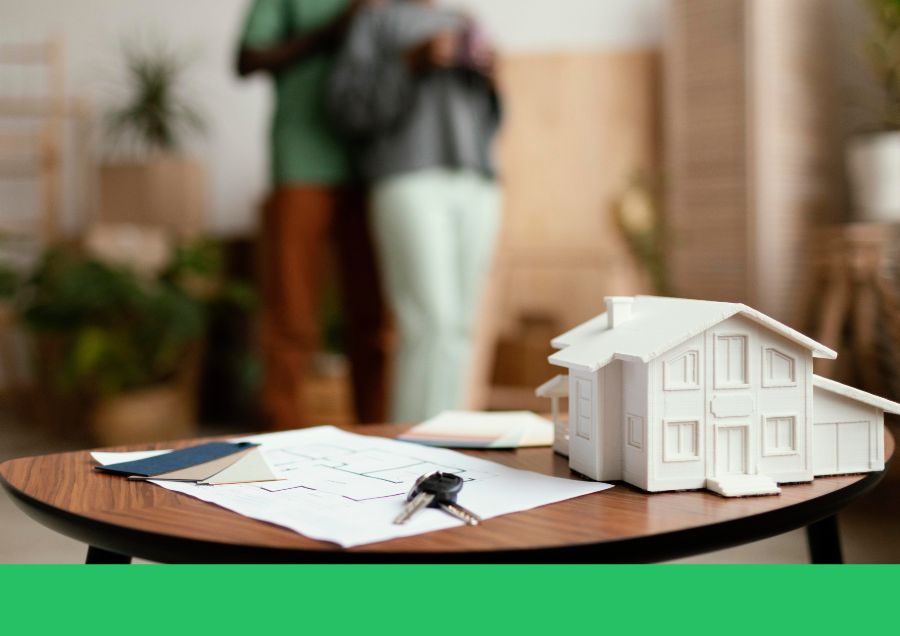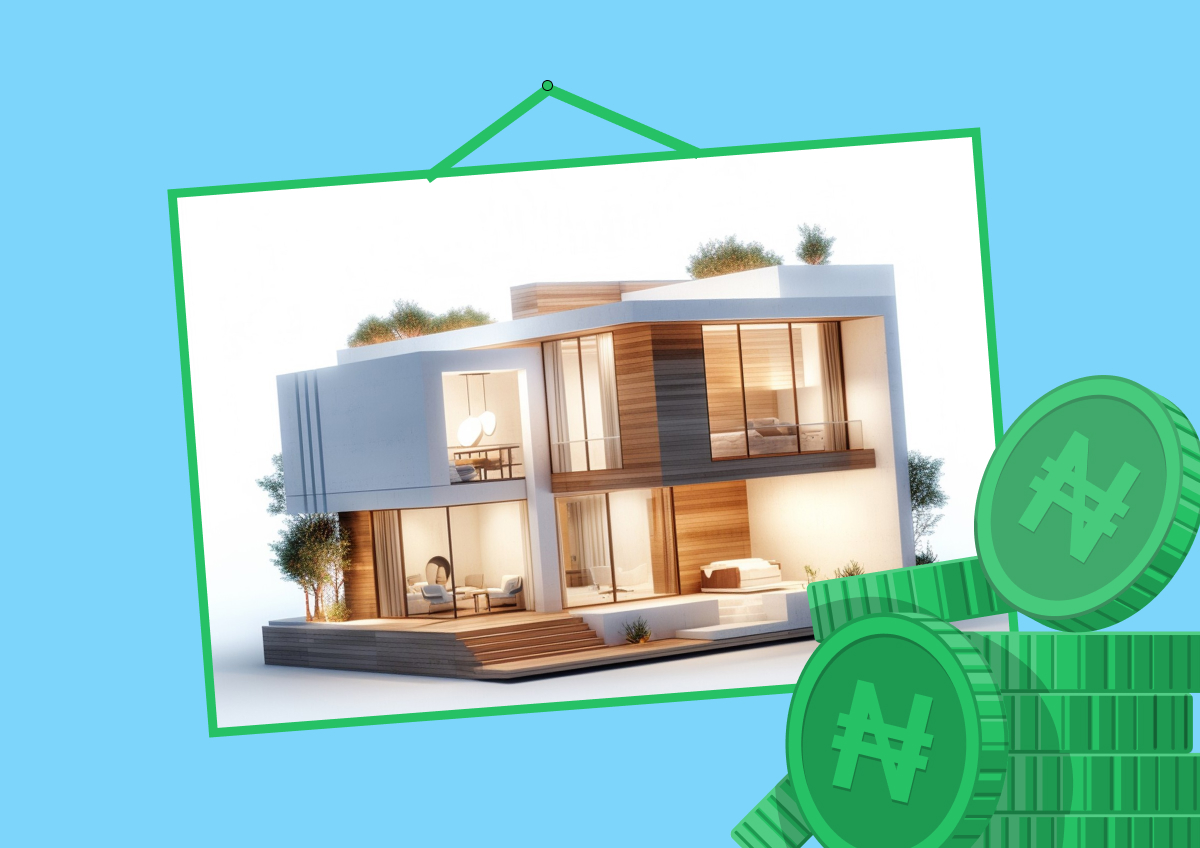Owning a house is a great achievement and a dream come true for many. Rightly so, because having somewhere to call your own is definitely a thing of joy for most people.
Given the cost implications of buying or owning a house, a strategic savings system is necessary to achieve it.
How Much Do I Need to Save Monthly To Buy a House?
When it comes to saving money to buy a house, there’s really no specific amount attached to it. However, the amount you can set aside depends on various factors:
- Monthly or yearly earnings: When planning to save to get a house, your income determines how much you can save each month. The higher your income, the easier it is for you to save your house-buying funds.
- Location of the house you need: The cost of a house can vary depending on the location. For example, houses in popular areas like in Lekki Lagos tend to be more expensive than the others in places like Ojodu Berger or other less popular states in Nigeria.
- Spending habits: The amount you spend regularly can affect how much you can save each month. However, you can monitor your expenses to see ways you can free up more funds.
In addition to the factors mentioned above, you can plan your savings strategy based on the cost of the house put down by the house agent.

How To Save Money To Buy a House
- Step 1: Understand Your Current Income and Expenses
Before you decide to buy a house, it’s important to understand your current income. You can do this by analyzing your salary or any additional earnings and tracking your monthly expenses, such as transportation and other living expenses.
- Step 2: Debts and Other Financial Obligations
Outstanding debts can influence how much you save to buy a house. So, it’s important to pay off high-interest debts first, as this will help free up funds for savings. You can also suggest low-interest rates to the lender to make repayment easy.
- Step 3: Determining The Total Amount Needed
After understanding your income level, it’s time to figure out how much you’ll be willing to save for a house. This will include a down payment, which is usually 20% of the house’s worth, and closing costs, which can range from 2% to 5% for the buyer and 6% to 10% for the seller. Additionally, you’ll have to consider moving costs as hiring movers.
- Step 4: Determine How Much To Save Monthly Based On Your House-buying Timeline
You can determine your saving strategy based on your house-buying timeline, whether it’s in the next year, two years, or longer. To know your monthly saving goals, divide the amount needed by the number of months in your timeline.
Additionally, stay on your goal and make necessary adjustments based on an increase in your income or increase in expenses.
Where To Save Money To Buy a House
If you are looking to save money over time to buy a house, the best place to save towards this goal is with a fintech savings app. The best fintech saving app to reach your goal of buying a house is Sycamore NG. With the app, you can easily set your savings goal, determine how much you want to save and at what interval (daily, weekly or monthly) towards buying or building your dream house.
If you are still wondering about the best savings account to save money to buy or build a house, here is why Sycamore NG excels at this. You can automate your savings deduction at your own set interval (daily, weekly, monthly), making the process seamless and reaching your goal easy. Also, the company offers up to 24% interest on your savings and cashback rewards – all of these which are not possible with traditional banks.
How To Save For a House On Low-Income
- Government Assistance Programs and Grants For First-time Homebuyers
For individuals with low incomes, various government assistance programs and grants are available to help them achieve their homeownership goals. Programs like the National Housing Fund(NHF), Federal Mortgage Bank of Nigeria (FMBN), and state-specific housing programs offer loans to first-time housebuyers. Taking advantage of this opportunity will help increase their savings rate.
- Side Hustles or Freelance Work to Boost Income
To reach your target, you can consider a side hustle or become a freelancer. This extra income can go directly into your house-saving funds. If you want to become a freelancer, check sites like Upwork, LinkedIn for jobs. You can also start a small business, a blog, or a YouTube channel as a side hustle.
- Shared Living or Downsizing to Cut Costs
This is another effective way you can save money for a house as a low-income earner. Once you find a roommate to split the rent with or move into a more affordable apartment, you’ll have more money available to save to achieve your house-buying or building goal.
- Creative Budgeting and Prioritization
It isn’t advisable to spend more than you earlyy, especially if you plan to have savings. You need to carefully track your expenses, determine your needs/wants, and avoid impulsive spending. By doing this, you’ll be able to allocate more funds to your house-buying savings.
Saving For Different House-buying Time Scenarios
Your savings strategy varies depending on your house-buying timeline. For instance, the saving strategy used for a 1-year timeline will be totally different from a 5-year timeline. Here are some tips on saving towards buying or building a house based on your set time frame to reach that goal.
- In 2 years: If you’re planning to save money to buy or build a house in two years, You can also start an aggressive savings plan where you save at least 30% of your income in order to achieve your goal fast. You can also consider getting financial support or loans from the bank or other lending institutions that give loans for housing purposes to make up the needed amount.
- In 5 years: If you want to save money to buy a house in 5 years, you should maintain a steady savings plan and try out possible investments that can provide returns to boost your house-buying funds. This should be low risk investments that promise an almost sure low-yield returns over a period of time.
- In your 20s: If your plan is to save money to buy or build a house in your 20s, you can get a job and continuously save some funds from your monthly earnings to help you reach your goals. In addition, you can practice delayed gratification and stay disciplined to reach your goal.

Building a House vs. Buying
Depending on one’s orientation and stage of life, most people would beleive that buying a house is less expensive and less challenging than building one. But is this really true? Which one is better for you? Well, it turns out that there is no right or wrong approach to this. We will compare the pros and cons of both approaches and leave you to choose which path to follow based on what works best for you and fits better into your unique situation.
Pros and Cons Of Building A House
Buying a House
Pros:
- Immediate Availability:
- You can move in right after the purchase, making it a quicker option compared to building a house, which can take several months or even years.
- Established Neighborhood:
- Buying an existing house often means purchasing in an established neighborhood with mature landscaping, developed infrastructure, and existing community amenities.
- Potential for Negotiation:
- There may be room for negotiation on the purchase price, which can result in cost savings compared to the potentially fixed costs of building.
- Historical Charm:
- Older homes may have unique architectural details and a character that can be difficult to replicate in new construction.
Cons:
- Maintenance and Repairs:
- Older homes may require more maintenance and immediate repairs, which can add unexpected costs.
- Limited Customization:
- You are restricted to the existing layout and design of the house, and major renovations can be costly and disruptive.
- Potential for Hidden Issues:
- There might be hidden issues such as structural problems, outdated plumbing or electrical systems, and other issues that aren’t immediately apparent.
- Energy Efficiency:
- Older homes may not be as energy-efficient as new builds, potentially leading to higher utility bills.
Building a House
Pros:
- Customization:
- You have the freedom to design your home exactly as you want, from the layout to the materials and finishes used.
- New Construction Standards:
- New homes are built to current building codes and standards, often making them more energy-efficient and safer.
- Lower Maintenance:
- Everything in the house is new, which means fewer repairs and lower maintenance costs in the early years.
- Modern Amenities:
- You can include the latest technology and amenities, such as smart home features, energy-efficient appliances, and advanced home automation systems.
Cons:
- Time-Consuming:
- Building a house can take a significant amount of time, often several months to over a year, which can delay your move-in date.
- Higher Upfront Costs:
- The upfront costs for building can be higher, including land purchase, construction costs, permits, and possibly temporary living arrangements during construction.
- Potential for Cost Overruns:
- Construction projects often face unforeseen issues that can lead to budget overruns, increasing the final cost of the home.
- Stress and Complexity:
- Managing a construction project involves a lot of decisions, coordination with builders, and dealing with potential delays and issues, which can be stressful and complex.
Cost Consideration and Timeline For Building a House
When considering building a house, the costs involved are significantly influenced by several factors. The primary costs include the price of the land, the design of the building, and the location. For example, a bungalow in Lekki, Lagos will cost around 30 million to 50 million to build or buy vs the same type of house in other states in Nigeria which will be way cheaper.
The timeline for building a house also varies based on the complexity and design of the project. A standard two-storey house typically takes about 4-6 months to complete if everything goes smoothly.
On the other hand, Buying a house involves different cost considerations compared to building one. The total expenditure includes not just the purchase price of the property but also several additional costs.
The timeline for buying a house is generally shorter and more predictable than building one. The process of searching for a suitable home can take a few weeks to several months, depending on market conditions and specific preferences.
Summary of the cost and timeline to buy or build a house
Building a House:
- Costs: Land purchase, construction costs, design fees, potential overruns.
- Timeline: 4-6 months for standard builds, potentially extending to a year or more due to unforeseen circumstances.
Buying a House:
- Costs: Purchase price, closing costs (lawyer’s fee, survey plan, mortgage fees, stamp duty, equity contribution, insurance, bills).
- Timeline: A few weeks to find a house, 30-60 days to close, immediate move-in.
Saving money to buy or build a house is a great idea. Even though it comes with various challenges, with the right help, you can make the right decisions. Lastly, no matter your source of income, saving to get a house is never impossible. All you need are the right strategies, like the ones we’ve mentioned here. So take your time; you can do this!
Ready to start contributing towards reaching your goal to buy or build a house? Sycamore is built for this. Get started, download the app here.





